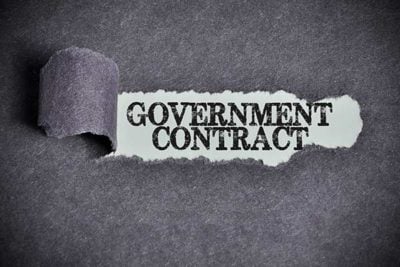The government is the largest buyer of goods and services in the world. Every year the U.S. government spends a half trillion dollars on contracts for goods, services, research and development. Fortunes are made in government contracting. Small businesses and startups bid on a variety of government contracts such as defense and aerospace contractors, service contractors, technology companies and procurement suppliers. The Department of Defense (DOD) accounts for the largest portion of government spending. Bidding for government contracts requires certain requirements and qualifications.
Government contractors
Government contractors are comprised of two types – primes and subs. The U.S. government awards government contracts to prime contractors. Prime contractors usually hire subcontractors to perform work in accordance with a subcontracting plan established by the government. Prime contractors work directly with the government and provide a single point of contact. Both prime contractors and subcontractors have to follow government guidelines that dictate how contracts must be performed.
The prime contractor may be subject to compliance reviews to ensure they follow the subcontractor guidelines set forth in the contract. Likewise, subcontractors must adhere to their requirements in their subcontracting plans and may be subject to compliance reviews.
The largest prime contractors of the U.S. government:
- Lockheed Martin
- The Boeing Company
- General Dynamics
- Raytheon
- Northrop Grumman
- McKesson Corporation
- United Technologies Corporation
- L3 Technologies
- Bechtel
- BAE Systems
The list is primarily defense contractors. McKesson is a healthcare conglomerate and Bechtel is the largest construction company in the country.
Finding contract opportunities
Small businesses can find contracting opportunities by researching multiple databases such as the Dynamic Small Business Search (DSBS) which is maintained by the SBA. Government agencies are required to publish contracts over $25,000 in the FedBizOpps.gov database.
The General Services Administration (GSA) is the government agency that matches government buyers with contractors. Being approved to do business with the government is referred to as “getting on the GSA Schedule”.
Government subcontracting opportunities are listed on the SubNet database and the GSA subcontracting directory. The SBA and DOD also provide a directory of subcontracting plans that have been awarded to prime contractors. The Federal Procurement Data System lists agency contracts and USASpending.gov tracks contract spending.
Many government agencies help small businesses win contracts through an Office of Small Business Programs (OSBP). Agencies also publish a procurement forecast listing contract opportunities.
Small Business Government Contracts
The government’s goal is to award at least 23% of all government contracts to small businesses. With the help of the SBA, the government limits or sets-aside certain contracts for small businesses which are called “set-asides”.
 Competitive contracts are used when at least two small businesses can perform the work or provide the products. All government contracts under $150,000 automatically qualify for set-aside contracts.
Competitive contracts are used when at least two small businesses can perform the work or provide the products. All government contracts under $150,000 automatically qualify for set-aside contracts.
Sole-source contracts are used when a contract can be fulfilled by a single business.
The Small Business Administration (SBA) sets aside government contracts for these special assistance programs:
- 8(a) Business Development program – disadvantaged businesses
- HUBZone – historically underutilized business zones
- Women-owned small businesses
- Service-disabled veteran owned small businesses
Small business prime contractors are required to perform minimum levels of work on a government contract in order to prevent otherwise ineligible businesses from using small or disadvantaged businesses to win government contracts.
Joint ventures between two or more businesses are common when they want to pool their strengths and efforts to compete for a contract award.
Bidding requirements and qualifications
Small businesses looking to bid for government contracts must know their North American Industry Classification System (NAICS) code and register with the following:
- Dun & Bradstreet (DUNS)
- System for Award Management (SAM)
- Small Business Administration (SBA)
You’ll need to know your primary NAICS code and possibly multiple NAICS codes for the products and services that your business provides. Federal and state governments use NAICS codes for administrative, taxes and contracting purposes.
 Your business must be registered with Dun & Bradstreet to get a DUNS number. The government uses your DUNS number to identify your business in their government systems.
Your business must be registered with Dun & Bradstreet to get a DUNS number. The government uses your DUNS number to identify your business in their government systems.
To compete for government contracts, you must register your business with the System for Award Management (SAM). The information will be used in the SBA’s Dynamic Small Business Search (DSBS) government database that is used to search for contractors. Your SAM profile is like having a resume.
Register your business with the Small Business Administration (SBA) so that you’ll be certified and eligible for these contracting assistance programs:
- 8(a) Business Development program – disadvantaged businesses
- HUBZone – historically underutilized business zones
- Women-owned small businesses
- Service-disabled veteran owned small businesses
Secure government contract financing
Government contract financing allows you to find more contract opportunities, since you’ll have more working capital in your business. Proper financing will allow you to successfully bid on more government jobs and projects.
After your business wins a contract, you may want to hire a government factoring company to process and factor your government contract invoices to speed up your payments. Many factoring companies can get your business setup within one to two weeks. Once you’re account is set up, your invoices can be funded within one to two days.